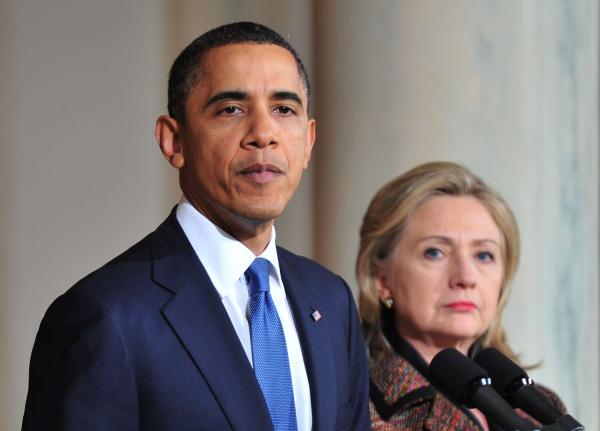
Next Tuesday marks the 79th day of NATO’s military campaign to protect Libyan civilians and force Libyan leader Moammar Gadhafi to abdicate power.
A dozen years ago, 78 days were required to compel then Serbian President Slobodan Milosevic to withdraw his army from Kosovo. The comparison is inexact as both crises are quite different. But, ultimately, Milosevic fell from power; faced justice in The Hague and died during a lengthy trial of natural causes.
Eighty, 180 or 800 days from now, Gadhafi may or may not still be at large and in charge of some part of Libya. For the Obama administration, the ultimate day of reckoning falls 15 months hence in November 2012 and the presidential elections. More about that shortly.
Kosovo and the early part of 1999 marked the ebb of President Bill Clinton’s two terms in office. About to be impeached by the U.S. House of Representatives over the Affair Lewinsky, Clinton was facing a crisis over Kosovo as well. Added to the drama, NATO was celebrating its 50th anniversary at the heads of state summit in Washington.
To recall events, Milosevic was determined to stamp out resistance against Belgrade in the Serbian province of Kosovo by killing or expelling — mistakenly and too politely called “ethnic cleansing” — ethnic Albanians. The bombing campaign to end the slaughter, authorized by U.N. resolution, began March 24, 1999, and would end 78 days later. It was close-run thing.
Ultimately, under great pressure by the Russians who finally sided with NATO and despite the great reluctance and indeed refusal of the Clinton administration to consider using ground forces until the situation was in extremis, Milosevic capitulated. NATO succeeded. And, of course, the Senate didn’t convict Clinton.
Libya is neither Kosovo nor Serbia. For one thing, it has oil. For another, Gadhafi did choose to turn to the United States foregoing his weapons of mass destruction programs and opposing al-Qaida. But, as President John F. Kennedy quipped, “the only thing worse than being an enemy of the United States was being a friend,” something that former Egyptian President Hosni Mubarak must surely be lamenting.
Further, the United States didn’t take the lead in Libya as frontally as it did in Kosovo. An unattributed White House spokesman called the Libyan operation “leading from behind.”
The U.N. Security Council vote, with five major abstentions and the call by the Arab League and Gulf Cooperative Council for action to protect Libyan civilians made it difficult for the White House to eschew using military force. And the aggressiveness of French President Nicolas Sarkozy and British Prime Minister David Cameron to begin military operations also trapped the White House.
Obama was described as ambivalent in deciding what to do and reportedly only the threat of resignation by Secretary of State Hillary Clinton forced action, a charge since denied by the administration.
Regardless, the United States would play a less visible role in the military campaign providing only the enabling capabilities such as refueling, intelligence and support NATO lacked. Cameron wasn’t happy over U.S. refusal to deploy more force in making direct attacks against Gadhafi and his army.
Whether this breech was repaired by the Obama visit to Europe last week is unclear although media reporting was quite positive over reinforcing the famous U.S.-U.K. special relationship.
Ultimately, Gadhafi has two choices: stay or go. The latter choice is made more unsavory and untenable by an arrest warrant issued by the International Criminal Court ruling out most savory places for a comfortable exile. And it is possible that a coup or a “lucky” bomb attack could end the stalemate.
NATO also has two choices: hope the sanctions and air attacks work or use ground forces to finish the job once and for all. For the time being, the expectation is that the former will work. In comparison, Milosevic remained in power for more than a year after the Kosovo campaign and then another year until his arrest.
A British MP who recently visited Libya argued, so far unsuccessfully, that a negotiation with Gadhafi headed by a figure of international standing might lead to resolution with the colonel being offered asylum in a yet-to-be-designated state. Reports are that South African President Jacob Zuma is headed to Libya.
Assuming Gadhafi remains in power well into 2012, something that may not happen, Obama will face a major domestic political problem. Accused of “dithering” in taking action in general, although the bold decision to approve the raid to kill or capture Osama bin Laden is a partial inoculation to that charge, Republicans will have an irresistible target for attacking the president using Gadhafi as the poster child.
Domestic politics are usually not good reasons to change course. But Days 79 and well beyond might force a recalibration.
Harlan Ullman is Senior Advisor at the Atlantic Council, Chairman of the Killowen Group that advises leaders of government and business, and a frequent advisor to NATO. This article was syndicated by UPI.
Image: Obama-Libya.jpg
